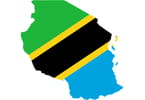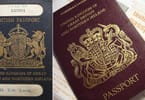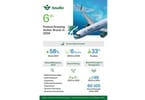In 2009 European travel expenditure declined by €31bn (-7.8%) to €368.9bn or €715 per person, since pre-recession 2008 when travel spending hit nearly €400bn
· 2010 European travel revenues forecast to fall by -0.4% (€1.6bn) to €367.4bn or €709 per person. However, financial fallout from volcanic ash estimated to have cost airlines €180.4 million per day worldwide – a cumulative loss of €902 million for five whole days worth of disruption
· Online travel market better equipped to deal with travel chaos, having soared from €58.4bn in 2008 to €66.9bn in 2009, and an estimated €74.3bn by the end of 2010 – equivalent to 20% of overall travel expenditure today
· In 2010, France (€88bn), Germany (€82bn), and the UK (€44bn) will account for €214bn or 58% of all European travel expenditure – Poland (€3.8bn) and Denmark (€7.4bn) will have the lowest overall spend
· The countries with the highest spend per person in 2010 will be Norway (€1,692), France (€1,364), and Denmark (€1,345) – travellers from Poland (€100), Spain (€451) and Italy (€499) will be the most frugal.
Whilst on holiday, the Danes will spend the most per day (€115), followed by the Norwegians (€98), and the Swiss (€83) – Polish (€21), Spanish (€35) and British (€55) tourists have the tightest budgets
The eruption of an Icelandic volcano last week has caused unprecedented travel chaos, leaving millions of European travellers stranded abroad and costing airlines worldwide over $250 million a day in losses according to Iata, the airline’s international trade body2. The incident will only add to the travel industry’s woes as 2010 was already set to be a difficult year for the European travel sector, with spending set to fall -0.4% (€1.6bn) below the levels seen in 2009, and -8% (€32.6bn) below the record levels seen in 2008 according to Kelkoo’s European Travel Index.
However, the new report issued today by Kelkoo reveals that the online travel sector is better equipped to deal with the disruption and will continue to buck industry growth trends. According to the study, the European online travel sector is solidly on course to sustain its recession-busting performance throughout 2010, with spending projected to rise by €7.4bn this year to €74.3bn compared to €58.4bn in 2008 – a 27% increase. Over the same period, overall travel sales will have decreased from €400bn in 2008 to an estimated €367.4bn by the end of 2010.
The “European Travel Index” report, commissioned by Kelkoo and carried out by the Centre for Economics and Business Research, provides a comprehensive review of travel spending trends in Europe over the past five years.
2009 was the ‘annus horribilis’ for the European travel industry; travel expenditure is traditionally volatile and never more so than during times of economic hardship when consumers tend to cut back on discretionary spending. The travel sector endured a €31bn or -7.8% year-on-year decline in sales from 2008 to 2009. According to the study, almost every European country reduced their travel spending last year as the global recession took hold, and the economic meltdown combined with high unemployment undermined consumer confidence and eroded consumer demand. The impact was most sharply felt in France (-11%) and the UK (-15%) where sales dropped by €10.8bn and €8bn respectively – the largest percentage decreases in Europe apart from Poland (-25%). However, the decline in last year’s UK and Polish travel revenues was exacerbated by the weakness of both countries’ exchange rates. In the UK for example, the pound fell by -6.8% year-on-year against the euro so although travel expenditure fell by -8.4% from £43.8bn to £40.2bn in sterling, the fall in euro terms was magnified to -15% from €54.5bn to €46.5bn. During the same period, Germany was one of only two countries to see an increase (€900 million / 1.1%) in travel spend in 2009, along with Switzerland (€600 million / 6.7%).
The Kelkoo Travel Index predicts a more positive outlook for the European travel sector in 2010, although forecasts will be affected by the volcanic ash incident which has cost the airline industry $250 million a day in worldwide losses for each day of lost business2. Although sales are anticipated to remain sluggish, spending is forecast to stabilise as the impact of the economic recovery feeds through. 2010 should see the annual rate of decline in travel sales decelerate significantly from -7.8% in 2009 to -0.4% as consumers make up for recessionary cut-backs.
Overall, France (€88.3bn), Germany (€82.4bn) and the UK (€44.1bn) will remain the countries with the highest travel spend during 2010, accounting for 58% (€214.8bn) of total European sales. In 2010 travel spending in France is expected to rise by a modest 1.2% or €1bn. Travel spending in the UK will also rise in 2.4% in sterling terms, from £40.2bn to £41.1bn, but will fall by -5.3% (€2.4bn) in euro terms compared to the previous year due to the weakness of the exchange rate, which has recently hit record lows. In Germany, travel expenditure will decrease only marginally from €82.7bn in 2009 to €82.4bn (-0.3%) this year. Spain will see the second largest drop (-0.7%) behind the UK in euro terms. The biggest percentage increases will be seen in Denmark (3.5%), Poland (2%), Sweden and Finland (1.5%).
The internet remains a key driver for holiday spending and the biggest growth area for the travel industry. More than half (54%) of all internet users across Europe use the web to research and book travel related services today. Online travel spending has soared from €58.4bn in 2008 to €66.9bn in 2009, and is forecast to reach €74.3bn by the end of 2010 – a €7.4bn or 11% year-on-year increase. Contrary to the decline experienced by the travel industry as a whole, online bookings will have risen by a recession-busting 27% since 2008 by the end of this year and by 146% or €44bn since 2005, when the online travel sector was worth €30.2bn. By the end of 2010, online travel sales will represent 20% of the travel market in Europe, having grown from a 9% share since 2005.
Almost 7 in 10 (69%) British holidaymakers use the internet to research and book travel, more than any other country in Europe. In 2010, UK online spending will reach €18.9bn, accounting for 43% of the UK’s entire travel industry and 25% of European online sales, a higher share than any other EU member state. In France, 53% of people regularly use the web to buy and research holidays, and internet spending is forecast to reach €12.9bn in 2010, equivalent to 15% of all French travel sales and 17% of European online holiday spending.
When it comes to the average spend per person on travel, the European average is expected to fall slightly from €715 in 2009 to €709 in 2010. The countries with the highest spend per person this year will be Norway (€1,692), France (€1,364), Denmark (€1,345), Sweden and Finland (€1,194). Those with the lowest spend per capita will be Poland (€100), followed by Spain (€451), Italy (€500) and the UK (€718). In 2009, Polish holidaymakers made the biggest cut-backs in Europe, reducing their travel expenditure by 25% from an average €130 in 2008 to €98 last year. The advent of the ‘staycation’ in the UK also had an impact, resulting in a 15% cut to individual travel budgets from an average €891 in 2008 to €760 in 2009. The average spend per person also declined by 12% in France, Norway and Finland during last year’s recession.
Whilst on holiday, the amount spent each day by European tourists also varies drastically. This year, travellers from Denmark are expected to splash out the most per day (€115) on accommodation, food, and attractions. Those from Norway (€98) and Switzerland (€83) hold second and third place. The tourists that spend the least per day are the Poles (€21), the Spanish (€35) and the British (€55). These differences in travel expenditure stem from key factors such as local income levels, the price of domestic holidays, and the general state of each country’s economy.
Bruce Fair, Managing Director of Kelkoo UK, comments: “The travel industry will need to buckle its seat belt for another bumpy ride in 2010, with sales forecast to fall by at least a further €1.6bn this year, adding to last year’s woes when sales plummeted by €31bn. Meanwhile, the online travel sector has proved resilient during the downturn, and is expected to continue to thrive in the post–recession era with a record turnover of €74.3bn forecast for 2010.”
“The good news is that travel operators have reacted to the situation by offering substantial discounts, driving down the cost of travel for European consumers. We expect this trend to continue in 2010 as travel companies and airlines aggressively compete with each other and the online sector to entice new customers. The internet offers consumers lower prices and greater choice. The web is also an invaluable research library offering travellers instant access to information such as independent reviews, recommendations, guides, travel tips and advice.”
Kelkoo’s travel service is a one stop shop which will make booking your holiday a much quicker and easier process. It compares prices from up to 100 travel websites so you don’t have to, and lists over 100 airlines for thousands of worldwide destinations; more than 150,000 hotels and over 250,000 holiday packages. With a cashback and discount voucher section available on the website, even bigger savings can be made on the cost of your next holiday.
WHAT TO TAKE AWAY FROM THIS ARTICLE:
- The Kelkoo Travel Index predicts a more positive outlook for the European travel sector in 2010, although forecasts will be affected by the volcanic ash incident which has cost the airline industry $250 million a day in worldwide losses for each day of lost business2.
- The incident will only add to the travel industry's woes as 2010 was already set to be a difficult year for the European travel sector, with spending set to fall -0.
- The “European Travel Index” report, commissioned by Kelkoo and carried out by the Centre for Economics and Business Research, provides a comprehensive review of travel spending trends in Europe over the past five years.






















